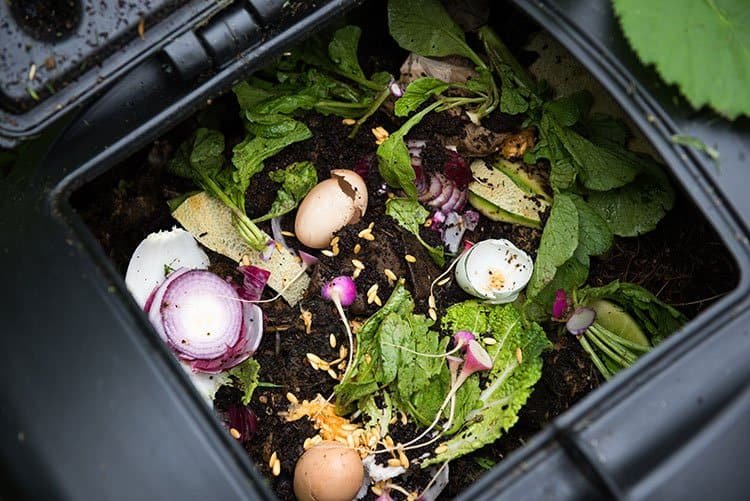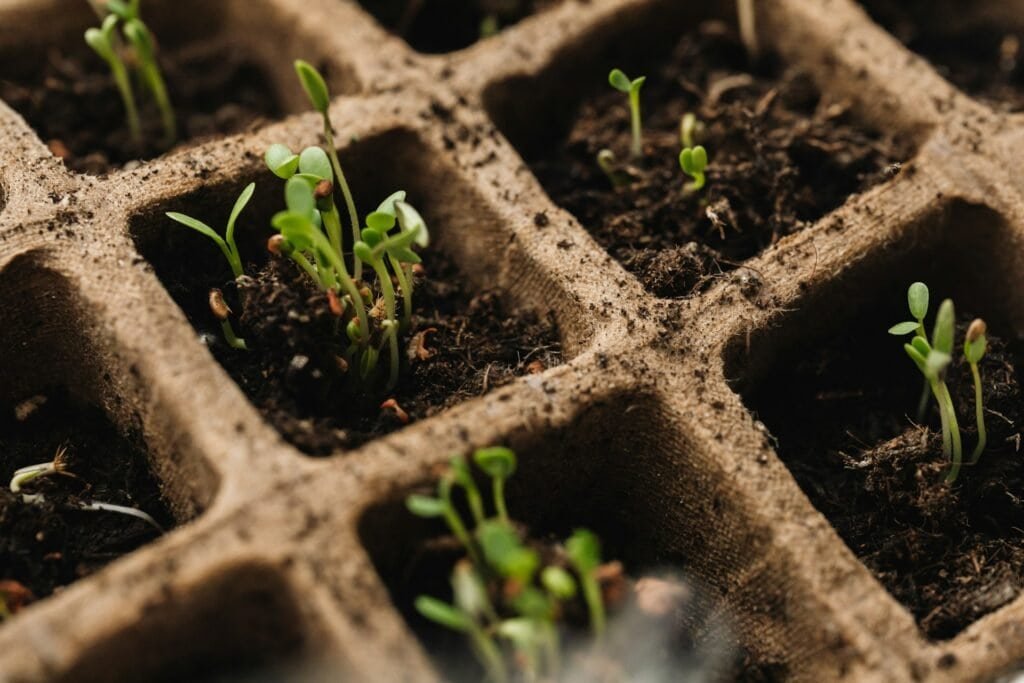Believing that you can’t compost in an apartment is a common misconception that compost is stinky and attracts pests. However, with the right indoor compost bin, collecting food scraps can be a clean and odor-free process. Apartment dwellers have tons of options for managing organic waste, from a simple compost bucket under the sink to a high-tech countertop composter. Even without a balcony or patio, you can enrich soil for indoor plants and keep waste from landfills.
For those with a bit more space, options like a compost tumbler on a balcony or a bin that handles grass clippings and other green waste can be a game-changer. Composting options for apartment living are versatile and designed to accommodate various lifestyles—whether you have a small kitchen corner or a sunny spot for a compact compost tumbler. Starting an indoor composting routine is not only beneficial for the environment but also for nurturing your homegrown herbs and flowers.

Embracing Urban Composting: Why It Matters
Choosing to compost in an apartment transforms kitchen leftovers into nutrient-rich soil that can be a boon for indoor houseplants. This practice is key in reducing greenhouse gas emissions, as it diverts organic material from contributing to the growing problem of waste in landfills. Urban composting is a simple yet impactful step towards sustainable living, even in the smallest of spaces.
The Environmental Impact of Composting in Apartments
When you compost in an apartment, you contribute to a larger environmental movement. Organic waste decomposing in landfills generates methane, a potent greenhouse gas. By composting, apartment residents can significantly reduce these emissions. Additionally, the resulting compost can be used to grow healthier plants, contributing to better air quality and the urban ecosystem.
Overcoming the Challenges: Odor and Pests
Effective management of garbage and recycling is crucial in preventing odors and pests, which are common concerns in apartment composting. By maintaining a proper balance of green and brown materials, ensuring adequate aeration, and regularly cleaning the compost container, these challenges can be mitigated, making composting an accessible and pleasant experience for all apartment residents.
Composting Methods for Apartment Dwellers
Even without a yard, apartment dwellers can utilize dry leaves to enrich their compost mix, providing essential carbon to balance the nitrogen from kitchen scraps.
Electric Composting: Harnessing Technology for Waste Reduction
Electric composting is an innovative composting method that can turn food waste into nutrient-rich amendments for potted plants, often delivering the nutrients in under 24 hours. It’s a convenient solution for indoor composting, significantly reducing your waste and contributing to a greener lifestyle without the need for a traditional compost pile.
Lomi: A Pioneer in Electric Composting for Apartments
Lomi is leading the way in electric composting technology for apartments, offering a compact and odorless system that fits seamlessly into small spaces. Its ability to break down organic waste quickly and efficiently makes it a favorite among eco-conscious urbanites looking to reduce their environmental footprint.
Traditional Bins: Making the Most of Indoor Composting
Traditional bins can be a soil amendment powerhouse for apartment dwellers, even without the inclusion of meat and dairy products, which can attract pests and are better suited for backyard composting. With the right supplies needed, these bins can turn kitchen waste into a rich soil enhancer while minimizing the release of methane gas.
When composting in an apartment, selecting an indoor compost bin that accommodates organic waste like egg shells and citrus peels is essential. The bokashi method is well-suited for countertop bins, allowing you to compost food scraps effectively. Bokashi compost is an anaerobic process that can handle a wider variety of organic materials, making it a versatile option for apartment living.
Bokashi: The Art of Fermenting Kitchen Scraps
Apple cores and other kitchen scraps can be transformed into valuable compost through the bokashi method, an easy and space-efficient fermenting process.
Bokashi composting is an excellent fit for apartment living due to its compact design and quick process, converting kitchen waste into pre-compost material that can be used to nourish plants or further decomposed in a traditional compost bin.

Starting Your Apartment Composting Journey
Embarking on your composting journey as an apartment dweller can be a rewarding experience, reducing your carbon footprint and creating a sustainable loop within your home.
Step-by-Step Guide to Setting Up Your Compost System
Setting up an apartment-friendly compost system involves selecting a suitable container, adding a mix of greens and browns, and finding a place in your home where it can be easily managed and accessed.
What to Compost: A Primer on Organic Waste Selection
As apartment dwellers begin their composting efforts, it’s important to know which materials are suitable for composting. A good food scrap collector can handle a variety of organic materials, making the selection process straightforward and efficient.
Tips for Maintaining Your Compost Bin Without Worms
Maintaining a compost bin without a worm bin or worm composter involves balancing organic materials, avoiding meat and dairy, and occasionally adding carbon-rich elements like paper bags and coffee filters. It’s important to maintain room temperature, provide adequate aeration through holes in the lid, and mix the contents regularly to facilitate decomposition. This approach supports sustainable living, even without the use of worms, and is ideal for apartment-friendly compost systems.
Innovative Solutions for Balcony and Shared Spaces
For those with a balcony or access to shared outdoor spaces, innovative composting solutions abound. Coffee grounds can enrich compost, and by starting a composting program or utilizing a compost service, apartment dwellers can contribute to public composting efforts. These strategies not only manage waste effectively but also foster a community spirit centered around sustainability.
Tumbler Composters: Rotating Your Way to Rich Soil
Tumbler compost bins are a great fit for apartment balconies, turning kitchen waste into nutrient-rich soil with a simple rotation. This method, which can complement bokashi compost, requires minimal outdoor space while keeping the composting process tidy and efficient. By rotating the contents regularly, residents can speed up the breakdown process and avoid attracting pests.
Compost Bags: A Compact Option for Limited Spaces
When outdoor space is at a premium, compost bags offer a space-saving solution for handling organic waste. These sturdy bags can be filled and stored with minimal fuss, making composting practical even in the smallest of apartments. By using compost bags, residents can still play a part in reducing landfill waste without needing a traditional compost bin.
Joining Forces: Participating in Community Gardens and City Programs
Engaging in a composting program through local community gardens or city-wide recycling programs can amplify the impact of one’s green efforts. Participation allows individuals to connect with farmers’ markets and other community resources, sharing in the collective benefit of turning waste into valuable compost for urban agriculture.

Troubleshooting Common Composting Issues
Even the most meticulous composters can encounter challenges, but with the right knowledge, these can be managed effectively.
Dealing with Unwanted Guests: Bugs and Maggots in Compost
Bugs and maggots can be an unwelcome sight in compost bins, but using sealed trash bags and mastering the art of backyard composting without worms can mitigate these issues. Regular maintenance and proper balance of compost materials are vital to keeping these pests at bay.
Accelerating the Composting Process Safely
To safely accelerate the composting process, one must balance green and brown materials, maintain adequate moisture, and ensure proper aeration. With these measures, decomposition can proceed at a brisker pace without sacrificing the quality of the compost.
Composting Without a Balcony: Freezer and Trench Method Techniques
Apartment composting isn’t limited to those with outdoor access; innovative indoor techniques can also contribute to waste reduction.
Freezing Organic Waste: A Temporary Solution for Composting
For apartment dwellers without immediate composting options, freezing organic waste serves as a temporary holding step. Using a food scrap collector, residents can freeze scraps until a suitable composting location is available, reducing odors and inconvenience.
The Trench Method: Composting for the Urban Gardener
The trench method is a discreet approach to composting in your apartment’s green spaces, reducing your carbon footprint by burying organic waste directly in the soil. This technique supports plant growth and soil health while being well-suited to the urban gardener’s limited space.
Enhancing Your Composting Experience
Composting can be a more enjoyable and efficient process with the right accessories and knowledge.
Composting Accessories: From Trash Bags to Soil Testers
From biodegradable trash bags to compost bags designed for indoor use, the right accessories can greatly enhance the composting experience. Tools like soil testers can also help monitor the health of the compost, ensuring it provides maximum benefit for plants.
Connecting with Local Markets and Online Resources for Composting
Building compost piles can be a communal effort, bolstered by connecting with local markets and online resources. These connections can provide valuable insights and support for composting endeavors, fostering a network of eco-conscious individuals.

The Future of Apartment Composting
As urban living continues to evolve, so too does the approach to managing waste sustainably.
Innovations in Urban Waste Management
Future innovations in urban waste management promise to bring even more efficient and accessible composting methods to apartment residents, further integrating sustainable practices into the fabric of city living. The role of technology in these advancements cannot be overstated, as it will make composting easier and more effective for everyone.
The Role of Technology in Advancing Composting Efforts
Technology is swiftly changing the landscape of urban composting, offering innovative solutions that streamline the composting process. Electric composters, like smart compact units designed for indoor use, are a game-changer for apartments, breaking down fruit and vegetable scraps efficiently without attracting pests. Sensors and software not only monitor and adjust conditions inside the composter for optimal decomposition but also help users track their environmental impact, reinforcing the eco-friendly habits of reducing household waste.
Advancements in biodegradable additives are also enhancing the efficiency of composting efforts. These additives accelerate the breakdown of waste items, ensuring a quicker transition from scraps to nutrient-rich soil. With technology’s help, apartment dwellers can now overcome previous space and management constraints, contributing to the green movement right from their living spaces.
Composting Rewards: From Soil to Sustainability
Reaping the benefits of composting extends far beyond the confines of an apartment. It’s about closing the loop of the food cycle, transforming waste into wealth, and contributing to a greener planet. Creating compost at home reduces the reliance on industrial fertilizers, supports plant growth, and fosters a deeper connection with the environment, laying the groundwork for a sustainable future.
The Joy of Harvesting Your Homemade Compost
There’s a unique satisfaction in witnessing the transformation of daily kitchen scraps into a rich, organic material. Apartment composters can experience the delight of adding their homemade compost to potted plants or sharing it with local community gardens. This tangible result of their efforts not only enriches the soil but also instills a sense of accomplishment and connection to the natural world.
How Composting Contributes to a Sustainable Lifestyle
Composting is a cornerstone of sustainable living, reducing landfill waste and greenhouse gas emissions. It empowers individuals to take an active role in waste management. By integrating composting into their daily routine, apartment residents can lower their carbon footprint, support local ecosystems, and pave the way for a more sustainable lifestyle that resonates with the ethos of farmer’s markets and eco-conscious communities.
Crafting a Greener Tomorrow: Final Thoughts on Apartment Composting
Apartment composting offers a sustainable path forward for eco-conscious city dwellers. By converting food scraps into compost, individuals contribute valuable nutrients back into the earth, supporting a cycle of growth and renewal. This process not only enriches indoor and outdoor plants but also diverts organic waste from the stinky trash bin, reducing landfill contributions. As indoor composters become more common, they serve as a testament to the viability of green living in even the smallest of spaces.
When materials are mixed and managed properly, apartment composting can be a seamless addition to one’s lifestyle, preventing the decomposition process from becoming a nuisance. Products like compost tea further enhance the value of composting, offering a liquid supplement packed with nutrients that benefit plant health. Embracing these practices, residents can play a crucial role in crafting a greener tomorrow, proving that even in apartments, sustainability is within reach.


